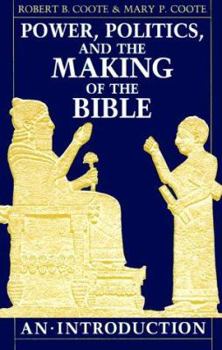Power Politics and the Making
Book by Coote, Robert B., Coote, Mary P. This description may be from another edition of this product.
Format:Paperback
Language:English
ISBN:0800624416
ISBN13:9780800624415
Release Date:January 1990
Publisher:Augsburg Fortress Publishing
Length:191 Pages
Weight:0.70 lbs.
Dimensions:0.7" x 5.5" x 8.5"
Customer Reviews
2 ratings
Bible's Inseparable Relation to Power, Politics Historical Matrix
Published by Thriftbooks.com User , 18 years ago
"To understand the social vision of the Hebrew Bible, it is essential to study the contours of the biblical world. How do the various institutions, social structures, and values of that world we term 'ancient Israel' intersect with the literary compilation we label the Hebrew Bible?" J. David Pleins, Santa Clara University What Have They Done to the Bible? In his above titled recent book (2005) Sandys-Wunsch, stressed the importance of historical Interpretation, in favor of Coote, stating, "The recovery of the meaning of ancient writing systems meant that documents from Egypt and Mesopotamia could show the cultural context of many biblical stories and concepts." In 1981, R. Coote emphasized socioeconomic conditions, interpreting Amos message as applied to Judah, in his 'Amos among the prophets,' and in the same year, B. Halpern published an erudite analysis of the sacral and political aspects of the monarchy in Israel, based on biblical sources. J. Flangan, in 'David's Social Drama,1988,' drawing on archaeological and social information presented a provocative interdisciplinary study on Early Israel. At least some of them followed the Cambridge's E. Mellor editorial work, 'The Making of the Old Testament, 1972,' a basic starting book on the subject. The Cootes added significant lively dimensions to the issues involved and may have catalyzed or anticipated recent controversial books on related issues, as 'The Mythic Past,and 'The Bible Unearthed.' Taking the Bible seriously: Taking the Bible seriously, wrote professor Coote recently, "means struggling to understand its meaning as well as affirming its truth." We are faithful to the Bible, said Placher, insofar as we struggle to understand its meaning for us, and faithful to one another insofar as we share that struggle. I sometimes get the impression that there are those in the church who may have forgotten how diverse the voices in Scripture are, and how difficult it can often be to figure out what a passage of Scripture means, to say nothing of agreeing with others on the meaning--this applies of course to those who through study have been taught or who have discovered for themselves the many and great difficulties facing the biblical interpreter. Studying the bible historically: Reading the Bible, stresses the pioneering scholar, is not just picking up the phone with a direct line to God; it is also a cross-cultural encounter. Taking the Bible seriously is fraught not only with all the hazards of cross-cultural understanding, compounded by every believer's conviction that it is a holy text, but also fraught with all the difficulties of understanding history, which, in the words of Robert Alter in his recent review of The Wilkomirski Affair, "is to engage with the extreme and often intractable heterogeneity of historical events, motives, and causes, and also of the experience of those who are caught up in particular historical processes" (New Republic, April 30, 2001, 38).
The Bible as Social History
Published by Thriftbooks.com User , 24 years ago
While this book is introduced by its authors as an introduction to the Bible and its history, it has much to offer both the layperson and the biblically knowledgable. For the average person seeking to understand the bible as a historical text, the authors outline how this book--so sacred and seminal to Western history--was created by everyday people as part of political struggles and triumphs stretching over eighteen hundred years (1250 B.C.E.to 550 C.E.(A.D.). For the biblical scholar, the book is an introduction, as well as outline for future scholarship, of the Bible using a sophisticated socio-historical approach which is only beginning to be accepted in traditional critical biblical studies circles. The book is dense with ideas, but elegantly well-written. It should be read by both Christians and Jews, since it shows an awareness of scholarship from both traditions, and demonstrates how the "Old Testament"/Torah and "New Testament" are historically linked in their respective productions as canons. For example, we read about how Jewish rabbis and Christian bishops selected and edited their inherited traditions in relation to their respective power struggles under the Roman empire; i.e.how the Mishnah and the Old and New Testaments were created and why. If you've ever wanted to know the real story behind this intriguing book- the Bible, then read "Power, Politics and the Making of the Bible."





